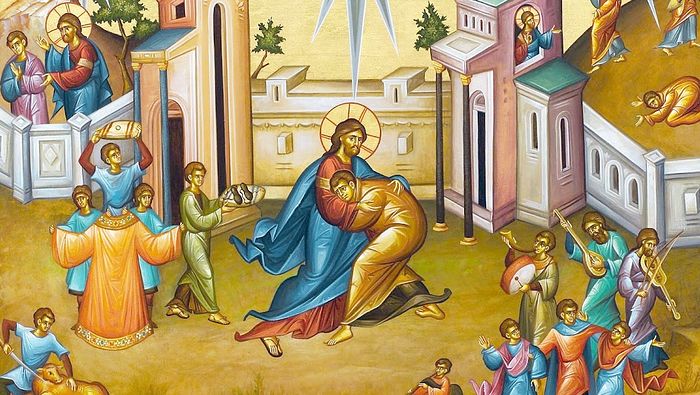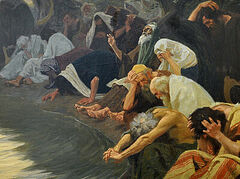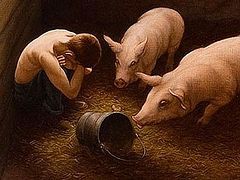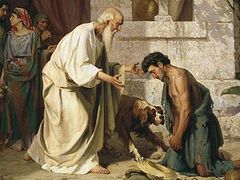Preparing her faithful children for the grace-filled time of Great Lent, a time of particular spiritual ascetic labors and repentance, the Church offers for our attention the parable of the prodigal son (cf. Lk. 15:11–12).
In the Gospel reading we hear one of the most famous narratives, which has found its reflection in all manifestations of human creativity. The Lord offered this parable of the prodigal son to all the people with the disciples gathered around Him. This is the story of how one rich man had two sons. One of these sons told his father to give him his share of inheritance. The father out of love did not contradict his son and did what he asked, giving him everything that would belong to him. This was a large property, because the man was wealthy. After this, the son took everything and left his father’s house, but very quickly wasted and spent all this wealth on a depraved lifestyle. He wasted it with depraved people, squandered it, and to make matters worse, a terrible famine came to the country where he was living. So, this man, who grew up in a good household, was forced to go to one of the people of that country and herd his swine—that it how far he fell. He endured such deprivation and hunger that he was happy just to eat what they gave him for the swine—but even that was not always available to him.
Then this prodigal son came to his senses and thought, “In my father’s house the hired servants live better than I do now.” He decided to return home, to repent before his father, and ask him to receive him, no longer as a son but as a hired hand, as a worker and servant.
No sooner had his loving father learned that his son was approaching than he was filled with delight, ran out to meet him, embraced him, and ordered that he be given the best clothing, a ring on his finger, and shoes, and he ordered a feast to be served to rejoice over his lost son’s unexpected return.
The gifts that the son demanded and received from his father are those gifts that we receive from God at birth: beauty, intellect, abilities, and talents. Who is the cause of our beauty and abilities, who is the source of our strength? Of course, they say that a person gets his appearance from his father and mother. But first of all it is from the Creator of Heaven and Earth; He is the Artist, and He creates such beautiful creations and bestows them with colossal abilities both intellectual and spiritual. Christians are even more abundantly bestowed with the gifts of the Holy Spirit, which they receive at Baptism in the Church.
But often man ascribes these gifts and talents to himself; he departs from God, does not wish to live any longer under the roof of His house, hear His commandments, or fulfill His requests. He wants pleasure without limits in his life. And often such a man quickly squanders all his talents and comes to a terrible state. And whether he understands it or not, he also begins to herd swine—he becomes a swineherd.
The holy fathers understand the Gospel swine to be human passions—that is, man no longer wants to work for God and abide in divine grace, and so he inevitably ends up in the company of these swine: the thoughts and passions that he serves, and the food he is ready to take—it’s all swinish.
In order to understand what a clear picture the Lord offered his listeners, we have to remember that His words were directed at the Jews, for whom pigs are an unclean animal. He said this in order to show the depth of this unfortunate son’s fall. From the member of a family and heir of a rich man he became a swineherd, eating together with the pigs. Pigs are by nature unclean animals. Nowadays we who live in cities are torn away from the earth, from labor, and these gospel words simply don’t reach us to their full extent. In this sense it is useful whenever the opportunity arises to go to a pig stye and take a whiff… to find out how repulsive it smells there. But that is precisely the smell of sin and the image of sin. It’s just that most people do not sense it as such in their everyday lives; for us, the stench of sin has become the smell of expensive perfume. We see sin all around us, but we usually can’t distinguish its true face, or smell its stench.
Now what many call beauty, glamour, or success—a competition, an agency, a festival, an award, a store of some kind and various things—all of this is clothed in beauty and fragrance, and only God’s children can feel the true stench and abomination of the swinishness that this world calls beauty, success, and something good. And people who dedicate their lives to serving all this suffer, their souls are hungry, just as the gospel prodigal son was hungry. But the Lord is ready to receive them too; we can see that the son’s repentance alone was enough to evoke such love and even gifts from the father—that is, from God.
There is another son in the parable. When he saw that his brother had returned, and when he saw the joy of his family, servants, and father—how did he react? He started complaining with envy and resentment to his father. And he doesn’t call his brother “brother”, but says, “This son of your squandered your possessions with harlots, and you are so happy at his return. But I who have always been with you have never been vouchsafed such love.” Unfortunately, this often happens with us. This sin, this habit of envying and judging our neighbor very often takes the upper hand in us over Christian love. As soon as someone in the Church does something good, or even simply some person near us, envy, criticism, and judgment immediately arise in our hearts. It seems to us that it would be better if that person had not done anything good, because we didn’t do it. This is a very terrible energy, a terrible force, and it enslaves us. It is the same when we don’t believe that a person has corrected himself, changed his life, become different. We like to remember and talk only about the bad things he’s done.
What is repentance? Repentance is a source of joy not only for the repentant person, but also for the angels. In that same chapter from St. Luke, before the Lord started relating that parable He says, “The angels rejoice over one sinner who has returned and repented” (cf. Lk. 15:10). We do not want to be angels, we want to be prosecutors, judges, and very often we are unable to share that joy with the angels.
Repentance is the path to salvation, deification, return to the house of our Heavenly Father; and that prodigal son is not only our neighbor or relative who is far from the Church—it’s all of us. Many of us have walked that path, many have found themselves in the Church, then begun to relax, fall away, return to that pig’s trough and forget divine grace.
The apostle says that our bodies are divine vessels; in them we must glorify God. He says literally that they are not created for fornication either spiritual or physical, but for glorifying God (cf. 1 Cor. 6:13).
The time of repentance is at hand; special spiritual joy, sorrow over sin, and the joy of uniting with God. And each of us must share this joy with the angels and strive with all our strength to bring someone to this Table through our example, our love. Let’s not be like that elder brother who judged his brother the sinner, but like the father, like the servants bring them in, so that as the apostle said today, together we might glorify God also in these bodies of ours, which are in fact God’s.
Amen.




